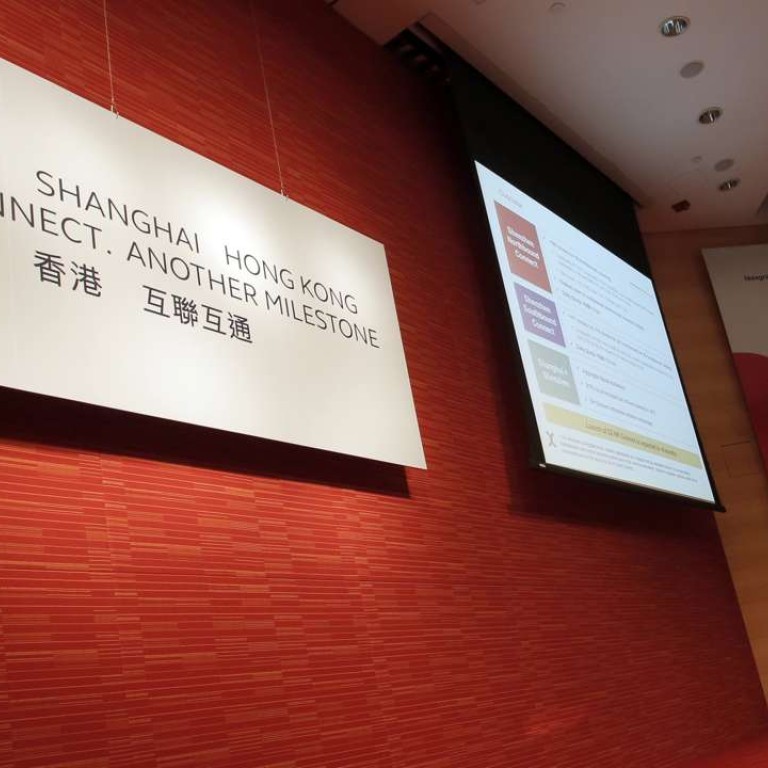
Shenzhen-Hong Kong Stock Connect may help push A shares closer to MSCI
The launch of Shenzhen-Hong Kong Stock Connect may increase the likelihood of index compiler MSCI adding mainland A shares to its influential benchmark index, which could attract billions of dollars of fund flows into the Chinese stock market.
But it may not be enough to tip the balance if restrictions are still in place preventing global investors from pulling money out of China or issuing Chinese financial derivatives overseas, according to analysts.
Hong Kong Exchanges and Clearing chief executive Charles Li Xiaojia said on Tuesday night that the new cross border scheme, which will allow international investors to trade 880 Shenzhen listed stocks and mainlanders to trade 417 Hong Kong stocks, will begin operation by Christmas this year.
HKEX’s Li said the launch of the Shenzhen and Hong Kong Stock Connect would definitely increase chances for A shares to be added to the MSCI index when the index complier conducts its next review.
“Since one of the major considerations of the MSCI is about market access, the new cross border scheme between Hong Kong and Shenzhen is going to remove this hurdle,” he said.
Li of HKEX said there will be no total quota for the Shenzhen and Hong Kong Stock Connect, while the total quota for the Shanghai and Hong Kong Stock Connect would be lifted immediately, which he described as a major step forward to further open up China’s market to international investors.

In 2014, China launched the Shanghai-Hong Kong Stock Connect to link the two cities’ stock markets under a total quota of 550 billion yuan.
“It improves the odds for MSCI to reconsider the A shares inclusion in the longer term. Shenzhen’s stock market accounts for nearly half of A shares’ market cap,” said Louis Tse Ming-Kwong, director of Hong Kong-based VC Brokerage.
Nonetheless, to clear the path China also needs to address some key issues worrying international investors, including the fund repatriation limit, Tse added.
Shenzhen’s market is home to most of the mainland’s high-tech and internet companies which tend to have high growth potential and subsequently great appeal to many fund managers.
“The biggest implication of the Shenzhen stock connect is that it shows China’s intention to internationalise its financial markets and open up to global investors as quickly as they can, via all types of channels,” Shenwan Hongyuan Research analysts Li Yimin and Li Huiyong wrote in a note.
Goldman Sachs analyst Kinger Lau previously speculated that Shenzhen stock connect could be important enough to prompt MSCI to open a special review for A shares.
“We believe a special review by the MSCI before the next annual review June is likely, should we see significant breakthroughs on the mentioned issues [of Shenzhen-Hong Kong Stock Connect],” Lau said in a research report in June.
However, other analysts said it may not be enough to tip the scales.
“We surely welcome the move, but it doesn’t solve the key concerns of global investors,” said Christopher Cheung Wah-fung, chief executive of Christfund Securities and the incumbent lawmaker for Hong Kong’s financial services sector who is seeking re-election for the seat.
We surely welcome the move, but it doesn’t solve the key concerns of global investors
MSCI Inc decided at its index review meeting in June to hold off on adding China’s A shares to its Emerging Markets Index, the third time since 2014 the decision has gone against China. The global index compiler cited three key concerns by international investors, including a 20 per cent fund repatriation limit for foreign institutional investors, the need to get pre-approval from Shanghai and Shenzhen stock exchanges to launch any financial products overseas, as well as the need to evaluate the effectiveness of policy changes in addressing “widespread trading suspensions” in A shares markets.
The “widespread trading suspensions” refers to the wave of trading halts that took place during the stock market turmoil a year ago. At that time, more than half of all listed Chinese companies, or some 1,400 firms, suspended their shares, putting a huge strain on market liquidity and worsening volatility.
On May 27, the Shanghai and Shenzhen stock exchanges published separate detailed guidelines on curbing voluntary stock suspensions, stating that companies must provide proper reasons and submit necessary documents to support their claims. Nevertheless, investors say they need more time to “assess the effectiveness” of the policy changes, MSCI said in a statement on June 15 after its index review meeting.
“[Investors] don’t want to send money into China and later find out they can’t get the money out, particularly for those mutual funds that could face redemptions,” Cheung said. “Investors also worry about the restrictions on investment strategy and liquidity risks due to the trading suspensions,” he added.
“The odds [for MSCI inclusion] may improve significantly if China could also unveil relevant policies to address those problems,” Cheung said.


